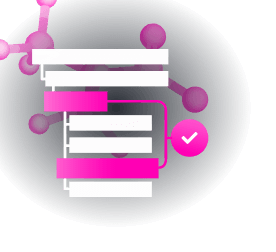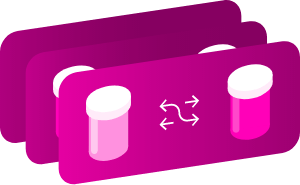Explore a selection of our essential drug information below, or:
Identification
- Summary
Tremelimumab is an anti-CTLA-4 antibody used to treat unresectable hepatocellular carcinoma in combination with durvalumab.
- Brand Names
- Imjudo
- Generic Name
- Tremelimumab
- DrugBank Accession Number
- DB11771
- Background
Tremelimumab, formerly known as ticilimumab, is a fully human IgG2 monoclonal antibody directed against cytotoxic T-lymphocyte-associated antigen 4 (CTLA-4). CTLA-4 is a cell surface receptor expressed on activated T cells to act as a negative regulator for T cells.2 By binding to CTLA-4, tremelimumab enhances T cell-mediated killing of tumours and reduces tumour growth.2,8 Because CTLA-4 is an immune checkpoint that plays a vital role in regulating T cell-mediated immune response, tremelimumab is considered an immune checkpoint inhibitor, which is an emerging cancer immunotherapy drug class.1
Tremelimumab was first approved by the FDA in October 2022 to be used in combination with durvalumab to treat hepatocellular carcinoma.8 It is also being investigated in other cancers, such as colon cancer, pancreatic cancer, non-small cell lung cancer (NSCLC), and malignant melanoma.2,3 After receiving an EMA Committee for Medicinal Products for Human Use (CHMP) recommendation in December 2022, tremelimumab was approved for combined use with durvalumab.12
- Type
- Biotech
- Groups
- Approved, Investigational
- Biologic Classification
- Protein Based Therapies
Monoclonal antibody (mAb) - Protein Chemical Formula
- C6500H9974N1726O2026S52
- Protein Average Weight
- 149000.0 Da (approximate)
- Sequences
>Tremelimumab heavy chain QVQLVESGGGVVQPGRSLRLSCAASGFTFSSYGMHWVRQAPGKGLEWVAVIWYDGSNKYY ADSVKGRFTISRDNSKNTLYLQMNSLRAEDTAVYYCARDPRGATLYYYYYGMDVWGQGTT VTVSSASTKGPSVFPLAPCSRSTSESTAALGCLVKDYFPEPVTVSWNSGALTSGVHTFPA VLQSSGLYSLSSVVTVPSSNFGTQTYTCNVDHKPSNTKVDKTVERKCCVECPPCPAPPVA GPSVFLFPPKPKDTLMISRTPEVTCVVVDVSHEDPEVQFNWYVDGVEVHNAKTKPREEQF NSTFRVVSVLTVVHQDWLNGKEYKCKVSNKGLPAPIEKTISKTKGQPREPQVYTLPPSRE EMTKNQVSLTCLVKGFYPSDIAVEWESNGQPENNYKTTPPMLDSDGSFFLYSKLTVDKSR WQQGNVFSCSVMHEALHNHYTQKSLSLSPGK
>Tremelimumab light chain DIQMTQSPSSLSASVGDRVTITCRASQSINSYLDWYQQKPGKAPKLLIYAASSLQSGVPS RFSGSGSGTDFTLTISSLQPEDFATYYCQQYYSTPFTFGPGTKVEIKRTVAAPSVFIFPP SDEQLKSGTASVVCLLNNFYPREAKVQWKVDNALQSGNSQESVTEQDSKDSTYSLSSTLT LSKADYEKHKVYACEVTHQGLSSPVTKSFNRGEC
Download FASTA FormatReferences:
- KEGG DRUG: Tremelimumab [Link]
- Synonyms
- Ticilimumab
- Tremelimumab
- External IDs
- CP 675,206
- CP-675
- CP-675,206
- CP-675206
Pharmacology
- Indication
Tremelimumab is indicated for the treatment of adult patients with unresectable hepatocellular carcinoma in combination with durvalumab.8,12 It is also indicated in combination with durvalumab and platinum-based chemotherapy for the treatment of adult patients with metastatic non-small cell lung cancer (NSCLC) with no sensitizing epidermal growth factor receptor (EGFR) mutation or anaplastic lymphoma kinase (ALK) genomic tumor aberrations.10,12
 Reduce drug development failure ratesBuild, train, & validate machine-learning modelswith evidence-based and structured datasets.Build, train, & validate predictive machine-learning models with structured datasets.
Reduce drug development failure ratesBuild, train, & validate machine-learning modelswith evidence-based and structured datasets.Build, train, & validate predictive machine-learning models with structured datasets.- Associated Conditions
Indication Type Indication Combined Product Details Approval Level Age Group Patient Characteristics Dose Form Used in combination to treat Metastatic non-small cell lung cancer Regimen in combination with: Durvalumab (DB11714) •••••••••••• ••••• ••••••••• Used in combination to treat Unresectable hepatocellular carcinoma (hcc) Regimen in combination with: Durvalumab (DB11714) •••••••••••• ••••• ••••••••• - Contraindications & Blackbox Warnings
 Prevent Adverse Drug Events TodayTap into our Clinical API for life-saving information on contraindications & blackbox warnings, population restrictions, harmful risks, & more.Avoid life-threatening adverse drug events with our Clinical API
Prevent Adverse Drug Events TodayTap into our Clinical API for life-saving information on contraindications & blackbox warnings, population restrictions, harmful risks, & more.Avoid life-threatening adverse drug events with our Clinical API- Pharmacodynamics
Tremelimumab is a cytotoxic agent that works to decrease tumour growth.8 It binds to its target, human CTLA-4, with high selectivity 2 and subnanomolar affinity.1 Tremelimumab caused increased IL-2 production in a dose-dependent manner in ex-vivo blood stimulation assays using peripheral blood mononuclear cells (PBMCs) from healthy volunteers and patients with cancer, indicating that tremelimumab stimulated T cell-mediated cytotoxicity. Tremelimumab also increased the proliferation of effector T cells.1
In vitro, there was no evidence of nonspecific cytokine release induced by tremelimumab or drug binding to Fc receptors.6,7
- Mechanism of action
T cell activation is influenced by several processes. T cell receptors (TCR), which are expressed on T cells, bind to the cognate antigen processed and presented by major histocompatibility complex (MHC) expressed on antigen-presenting cells (APC).5 This interaction generates a TCR signal to activate T cells. In addition to the TCR signal, optimal T cell activation requires a costimulatory signal, produced when CD80 and CD86, expressed on the surface of APCs, bind to receptors expressed on T cells.1 CD80 and CD86 are also referred to together as B7 molecules.4 In response to these signals, activated T cells can be further differentiated into specific T cell subtypes with specialized functions.5
Immune checkpoints are proteins that control the intensity and duration of T cell activation and response. CD28 and CTLA-4 are homologous receptors expressed on CD4+ and CD8+ T cell surface.4 These immune checkpoints have opposing regulatory functions on T cell activity: CD28 is a positive regulator of T cell activity, while CTLA-4 is a negative regulator suppressing T cell activation and proliferation, as well as IL-2 gene transcription.1,7 B7 molecules act as ligands to both of these receptors,4 and the balance between CD28 and CTLA-4 expression and signalling influence the extent of T cell activation. In cancer immunotherapy, CTLA-4 has been investigated as a therapeutic target as blocking this receptor can enhance the activation of tumour-specific T cells, allowing them to exert cytotoxic effects on tumour cells.1
Tremelimumab is an antibody directed against CTLA-4. By binding to CTLA-4, tremelimumab blocks the interaction of CTLA-4 with its ligands, CD80 and CD86, limiting its negative regulatory effect on T cell activation. Inhibition of CTLA-4 leads to increased proliferation of T cells in tumours and promotes T cell-mediated cytotoxicity.8
Target Actions Organism ACytotoxic T-lymphocyte protein 4 inhibitorantibodyHumans - Absorption
In patients with solid tumours who received tremelimumab doses 1 mg/kg, 3 mg/kg, and 10 mg/kg (1- to 10-times the approved recommended dosage) once every four weeks for four doses, the AUC of tremelimumab increased proportionally and steady-state was achieved at approximately 12 weeks.8
- Volume of distribution
The geometric mean (% coefficient of variation [CV%]) of tremelimumab for central (V1) and peripheral (V2) volume of distribution was 3.45 (24%) and 2.66 (34%) L, respectively.8
- Protein binding
Not Available
- Metabolism
- Not Available
- Route of elimination
Not Available
- Half-life
The geometric mean (CV%) terminal half-life of tremelimumab was 16.9 days (19%) after a single dose and 18.2 days (19%) during steady-state.8
- Clearance
The geometric mean (CV%) clearance of tremelimumab was 0.286 L/day (32%) after a single dose and 0.263 L/day (32%) during steady-state.8
- Adverse Effects
 Improve decision support & research outcomesWith structured adverse effects data, including: blackbox warnings, adverse reactions, warning & precautions, & incidence rates. View sample adverse effects data in our new Data Library!Improve decision support & research outcomes with our structured adverse effects data.
Improve decision support & research outcomesWith structured adverse effects data, including: blackbox warnings, adverse reactions, warning & precautions, & incidence rates. View sample adverse effects data in our new Data Library!Improve decision support & research outcomes with our structured adverse effects data.- Toxicity
There is limited information regarding the acute toxicity profile and overdosage of tremelimumab. The maximum tolerated dose in non-human primates was 100 mg/kg.9
- Pathways
- Not Available
- Pharmacogenomic Effects/ADRs
- Not Available
Interactions
- Drug Interactions
- This information should not be interpreted without the help of a healthcare provider. If you believe you are experiencing an interaction, contact a healthcare provider immediately. The absence of an interaction does not necessarily mean no interactions exist.
Drug Interaction Integrate drug-drug
interactions in your softwareAbciximab The risk or severity of adverse effects can be increased when Abciximab is combined with Tremelimumab. Adalimumab The risk or severity of adverse effects can be increased when Adalimumab is combined with Tremelimumab. Aducanumab The risk or severity of adverse effects can be increased when Tremelimumab is combined with Aducanumab. Alemtuzumab The risk or severity of adverse effects can be increased when Alemtuzumab is combined with Tremelimumab. Alirocumab The risk or severity of adverse effects can be increased when Alirocumab is combined with Tremelimumab. - Food Interactions
- No interactions found.
Products
 Drug product information from 10+ global regionsOur datasets provide approved product information including:dosage, form, labeller, route of administration, and marketing period.Access drug product information from over 10 global regions.
Drug product information from 10+ global regionsOur datasets provide approved product information including:dosage, form, labeller, route of administration, and marketing period.Access drug product information from over 10 global regions.- Brand Name Prescription Products
Name Dosage Strength Route Labeller Marketing Start Marketing End Region Image Imjudo Injection, solution, concentrate 20 mg/ml Intravenous Astra Zeneca Ab 2023-03-14 Not applicable EU Imjudo Injection, solution 25 mg/1.25mL Intravenous AstraZeneca Pharmaceuticals LP 2022-10-21 Not applicable US Imjudo Solution 20 mg / mL Intravenous Astra Zeneca 2023-10-23 Not applicable Canada Imjudo Injection, solution, concentrate 20 mg/ml Intravenous Astra Zeneca Ab 2023-03-14 Not applicable EU Imjudo Injection, solution 300 mg/15mL Intravenous AstraZeneca Pharmaceuticals LP 2022-10-21 Not applicable US
Categories
- ATC Codes
- L01FX20 — Tremelimumab
- Drug Categories
- Amino Acids, Peptides, and Proteins
- Antibodies
- Antibodies, Monoclonal
- Antineoplastic Agents
- Antineoplastic and Immunomodulating Agents
- Blood Proteins
- CTLA-4-directed Blocking Antibody
- Globulins
- Immune Checkpoint Inhibitors
- Immunoglobulins
- Immunoproteins
- MONOCLONAL ANTIBODIES AND ANTIBODY DRUG CONJUGATES
- Proteins
- Serum Globulins
- Chemical TaxonomyProvided by Classyfire
- Description
- Not Available
- Kingdom
- Organic Compounds
- Super Class
- Organic Acids
- Class
- Carboxylic Acids and Derivatives
- Sub Class
- Amino Acids, Peptides, and Analogues
- Direct Parent
- Peptides
- Alternative Parents
- Not Available
- Substituents
- Not Available
- Molecular Framework
- Not Available
- External Descriptors
- Not Available
- Affected organisms
- Not Available
Chemical Identifiers
- UNII
- QEN1X95CIX
- CAS number
- 745013-59-6
References
- General References
- Tarhini AA: Tremelimumab: a review of development to date in solid tumors. Immunotherapy. 2013 Mar;5(3):215-29. doi: 10.2217/imt.13.9. [Article]
- Authors unspecified: Tremelimumab. Drugs R D. 2010;10(2):123-32. doi: 10.2165/11584530-000000000-00000. [Article]
- Arru C, De Miglio MR, Cossu A, Muroni MR, Carru C, Zinellu A, Paliogiannis P: Durvalumab Plus Tremelimumab in Solid Tumors: A Systematic Review. Adv Ther. 2021 Jul;38(7):3674-3693. doi: 10.1007/s12325-021-01796-6. Epub 2021 Jun 8. [Article]
- Rowshanravan B, Halliday N, Sansom DM: CTLA-4: a moving target in immunotherapy. Blood. 2018 Jan 4;131(1):58-67. doi: 10.1182/blood-2017-06-741033. Epub 2017 Nov 8. [Article]
- Hwang JR, Byeon Y, Kim D, Park SG: Recent insights of T cell receptor-mediated signaling pathways for T cell activation and development. Exp Mol Med. 2020 May;52(5):750-761. doi: 10.1038/s12276-020-0435-8. Epub 2020 May 21. [Article]
- Ribas A: Clinical development of the anti-CTLA-4 antibody tremelimumab. Semin Oncol. 2010 Oct;37(5):450-4. doi: 10.1053/j.seminoncol.2010.09.010. [Article]
- Ribas A, Hanson DC, Noe DA, Millham R, Guyot DJ, Bernstein SH, Canniff PC, Sharma A, Gomez-Navarro J: Tremelimumab (CP-675,206), a cytotoxic T lymphocyte associated antigen 4 blocking monoclonal antibody in clinical development for patients with cancer. Oncologist. 2007 Jul;12(7):873-83. doi: 10.1634/theoncologist.12-7-873. [Article]
- FDA Approved Drug Products: IMJUDO (tremelimumab-actl) injection, for intravenous use [Link]
- Pfizer: Tremelimumab MSDS [Link]
- FDA Approved Drug Products: IMJUDO (tremelimumab-actl) injection, for intravenous use (November 2022) [Link]
- EMA Summary of Opinion: Imjudo (tremelimumab) [Link]
- EMA Approved Drug Products: IMJUDO (tremelimumab) Intravenous Infusion [Link]
- External Links
- PubChem Substance
- 347911239
- 2619313
- Wikipedia
- Tremelimumab
Clinical Trials
- Clinical Trials
Clinical Trial & Rare Diseases Add-on Data Package
Explore 4,000+ rare diseases, orphan drugs & condition pairs, clinical trial why stopped data, & more. Preview package Phase Status Purpose Conditions Count Start Date Why Stopped 100+ additional columns Unlock 175K+ rows when you subscribe.View sample dataNot Available Recruiting Not Available Unresectable Hepatocellular Carcinoma (HCC) 1 somestatus stop reason just information to hide 3 Active Not Recruiting Treatment Hepatocellular Carcinoma 1 somestatus stop reason just information to hide 3 Active Not Recruiting Treatment Metastatic Urothelial Cancer / Unresectable Locally Advanced Urothelial Cancer 1 somestatus stop reason just information to hide 3 Active Not Recruiting Treatment Non-Small Cell Lung Cancer (NSCLC) 1 somestatus stop reason just information to hide 3 Active Not Recruiting Treatment Non-Small Cell Lung Carcinoma 2 somestatus stop reason just information to hide
Pharmacoeconomics
- Manufacturers
- Not Available
- Packagers
- Not Available
- Dosage Forms
Form Route Strength Injection, solution Intravenous 25 mg/1.25mL Injection, solution Intravenous 300 mg/15mL Injection, solution, concentrate Intravenous 20 mg/ml Solution Intravenous 20 mg / mL Solution Intravenous 25.00 mg - Prices
- Not Available
- Patents
- Not Available
Properties
- State
- Liquid
- Experimental Properties
- Not Available
Targets

- Kind
- Protein
- Organism
- Humans
- Pharmacological action
- Yes
- Actions
- InhibitorAntibody
- General Function
- Not Available
- Specific Function
- Inhibitory receptor acting as a major negative regulator of T-cell responses. The affinity of CTLA4 for its natural B7 family ligands, CD80 and CD86, is considerably stronger than the affinity of t...
- Gene Name
- CTLA4
- Uniprot ID
- P16410
- Uniprot Name
- Cytotoxic T-lymphocyte protein 4
- Molecular Weight
- 24655.63 Da
References
- Ribas A, Hanson DC, Noe DA, Millham R, Guyot DJ, Bernstein SH, Canniff PC, Sharma A, Gomez-Navarro J: Tremelimumab (CP-675,206), a cytotoxic T lymphocyte associated antigen 4 blocking monoclonal antibody in clinical development for patients with cancer. Oncologist. 2007 Jul;12(7):873-83. doi: 10.1634/theoncologist.12-7-873. [Article]
- Kyriakidis I, Vasileiou E, Rossig C, Roilides E, Groll AH, Tragiannidis A: Invasive Fungal Diseases in Children with Hematological Malignancies Treated with Therapies That Target Cell Surface Antigens: Monoclonal Antibodies, Immune Checkpoint Inhibitors and CAR T-Cell Therapies. J Fungi (Basel). 2021 Mar 5;7(3). pii: jof7030186. doi: 10.3390/jof7030186. [Article]
- FDA Approved Drug Products: IMJUDO (tremelimumab-actl) injection, for intravenous use [Link]
Drug created at October 20, 2016 20:46 / Updated at April 30, 2023 10:33

